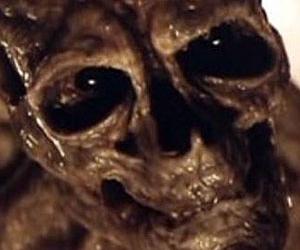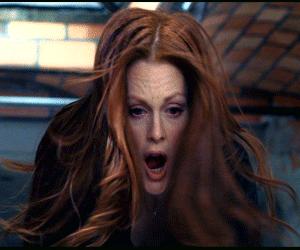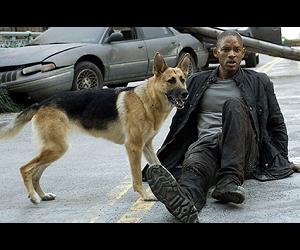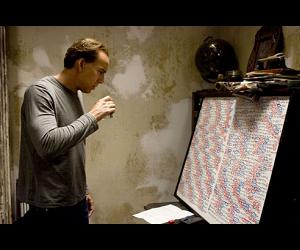7 Good Sci-Fi Movies Ruined by Terrible Endings
There is nothing more disappointing than a good story ruined by a terrible ending. This seems to happen more often in science-fiction movies than anywhere else, whether it is caused by a pointless twist, a lousy half-assed plot explanation, bad science, lazy writers, bad acting, or the intervention of test screenings. With that in mind, here are the seven sci-fi movies that frustrate me the most, because if their endings were better, they would be excellent films. Needless to say, if you haven't seen these, you will be spoiled. However, where these movies are concerned, I consider it my solemn duty to spoil you so that you won't accidentally watch them.
#1
Alien Resurrection
|  |
#1
Alien Resurrection
|  |
The fourth installment in the Alien series of films has a lot going for it. There are certain scenes that are memorable and unique in good ways, and the visuals of director Jean-Pierre Jeunet are unmatched. Sure, the characters are all pretty one-dimensional, the casting is questionable (especially Winona Ryder), and much of the dialogue is asinine, but the story--up to a certain point--is pretty good and the ride can be fun if you let it be. The stuff with the cloned Ripley is great, as is Sigourney Weaver's surprisingly nuanced acting and anything that hints at the psychology of the aliens (like the two aliens killing a third in order to escape or the aliens setting a trap).
However, once the queen alien gives birth to an alien/human hybrid while Brad Dourif waxes poetic about the whole thing (calling it--I'm not making this up--a "beautiful, beautiful butterfly"), the movie takes a swan dive past terrible into the realm of the truly awful. The hybrid itself is just stupid and unfrightening, especially with the cartoonish rabbit nose and scrawny limbs, and its death is ludicrously silly. There is even some pretty unforgiveable cheese that preceeds its entrance, like when it is revealed that Winona Ryder's character is an android and then one of the side characters goes into an obvious monologue which has no reason to exist outside of the writer (Joss Whedon) wanting to impress the audience with an unnecessary backstory.
But truly, all of the film's flaws could be forgiven if it weren't for that stupid hybrid at the end. I just can't express enough how absolutely horrible that thing is and how much it ruined not only the movie but the entire series of movies as well. If it weren't for that lame, goofy-looking beast, there probably would have been more Alien movies in the last decade.
#2
The Forgotten
|  |
#2
The Forgotten
|  |
The Forgotten presents itself as an interesting psychological thriller. Telly Paretta (Julianne Moore) believes that she had a son who suddenly disappeared, but nobody believes her. She sees a doctor who tells her that she is imagining the life she would have had had she not had a miscarriage. He then recommends that she be sent to a hospital, but she runs away in search of evidence that her son exists. She eventually experiences things that are seemingly inexplicable and starts to uncover a paranoid conspiracy involving "them."
If the solution to this puzzling mystery involved Julianne Moore being insane, it would have made sense. If the solution involved something metaphysical and strange, it might have worked. However, the solution the writers and filmmakers chose makes no sense and could never work. To put it simply, Telly's son was abducted by aliens who were conducting an experiment on whether the bonds of motherhood could be broken. Then there's a happy ending. If you make it all the way to the end credits, your IQ will be measurably lower than it was when you started watching the movie.
#3
I Am Legend
|  |
#3
I Am Legend
|  |
Even though the visual effects are pretty awful, I Am Legend could have been a masterful adaptation of the Richard Matheson novel of the same name. I don't believe that a movie based on a book has to be true to every detail and plot point, and the movie version of I Am Legend, for the most part, does a good job of being faithful without being a carbon copy. The setting and backstory are different, the main character, Richard Neville, is more of a scientist in the movie than he is in the book, and the baddies of the film are closer to zombies than vampires. All of this is perfectly acceptable, and if the story remained relatively true to Matheson's all the way through the end, I Am Legend would be a great movie.
Alas, the adaptation falls apart at the last minute. In the book, Richard comes across Ruth, a woman who appears to be a survivor like he is. However, he eventually figures out that she is infected and that she has been sent by other infected people to spy on him. She knocks him out and takes him back to her people, who have "evolved" into a new race of humans and have been attempting to build a new civilization. They aren't interested in being cured, because they believe the infection has turned them into a new and superior race. Richard, the only living human who has not been infected, is tried and convicted of mass murder (as well as torture for conducting his experiments) and sentenced to death. As he waits to die, Richard realizes that he has become the monster. It is ultimately an effective parable about perspective and the nature of change.
In the movie, Richard comes across a woman named Anna, who really is a survivor. The zombies attack and Richard gives Anna the cure he has been working on before sacrificing himself so that she can escape. She then drives off and is seen meeting up with other survivors. The problem with this--aside from the fact that she is somehow able to drive off of Manhattan island even though all the bridges and tunnels have been destroyed--is that it completely ruins everything Matheson was trying to accomplish with his original story. It reduces the story to a more standard zombie apocalypse tale and doesn't have Matheson's unique and edgy message, or any message for that matter. Even the alternate ending--which gets slightly closer to the spirit of the book--doesn't do the story justice, and is a grave disappointment from a movie that seemed like it was going to follow through all the way to the end.
#4
Knowing
|  |
#4
Knowing
|  |
The worst ending on this list belongs to Alex Proyas' Knowing, one of the most disappointing films I have had the misfortune of watching. The first two acts of the film offer an intriguing mystery involving philosophical determinism, shadowy strangers, and a series of numbers recovered from a time capsule that appear to predict the future. Though there are some awfully convenient plot points--like the hero just happening to be at the right place and right time to witness a plane crash predicted by the numbers--the movie seems to be heading somewhere mind-bending and cool as the climax approaches. Then, very suddenly, it all comes crashing down in the worst possible way.
You see, the world is about to end because of a giant, unpreventable solar flare. Aliens, knowing this, want to take children off the planet, because children are innocent. It was the aliens who sent the message (the numbers) just to prepare the children. In the end, the children are taken away and the world--along with our hero--is destroyed.
Forget the fact that aliens popping up as a plot device towards the end of a story (like in The Forgotten) is about as groan-worthy as multiple personalities being used to explain a murder mystery. Forget that destroying the entire world is usually a bad way to end a movie. Forget that the whole thing relies on the acting talents of Nicholas Cage. Even if you set all that aside, the conclusion is still terrible, because it doesn't make a lick of sense. Whenever a story is presented as a mystery, it should go without saying that the solution to that mystery should be satisfying and logical. The solution to the mysteries of Knowing is neither.
So you have aliens who are capable of predicting the future and who know that the Earth is doomed. They want to save the children. How does leaving a series of numbers in the hands of a crazy person help accomplish this goal? What is the point of the story if, in the end, the aliens appear to be able to save thousands of children, even though only one or two knew about the numbers? Why would they need to stalk the main character's son? And why small stones? None of these questions have answers.
Imagine if the final episode of Lost involved aliens landing on the island and offering half-assed nonsensical explanations for everything before taking away one person and allowing the island and everyone on it to be destroyed by a sudden volcanic eruption. If that's how Lost ended, Lost would still be better than Knowing. I am quite certain that an eight-year-old retarded child could write a better third act than the one we get in this abomination of a movie.
-e. magill 9/21/2010
|
|